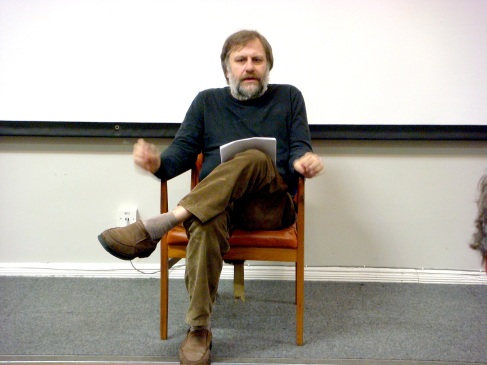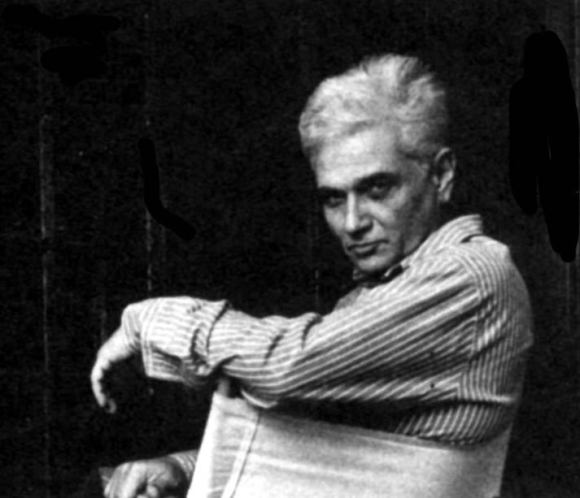Part VI: Slavoj Žižek’s mis-reading of différance and democratie à venir in Derrida
 I’d like to use this post to further how Slavoj Žižek’s mis-reading of Derrida in his text Did Somebody Say Totalitarianism? has led to a significant misunderestimation of Derrida as a potent political thinker; and to show how a thorough reading of important Derridean concepts such as différence and democratie à venir [democracy to come] contribute to his radical reading of the political.
I’d like to use this post to further how Slavoj Žižek’s mis-reading of Derrida in his text Did Somebody Say Totalitarianism? has led to a significant misunderestimation of Derrida as a potent political thinker; and to show how a thorough reading of important Derridean concepts such as différence and democratie à venir [democracy to come] contribute to his radical reading of the political.
As I have outlined previously, Žižek misreads categories such as the promise and messianism so as to posit an anti-political element within deconstruction itself: ‘what Derrida’s ‘radicalization’ of Marx means (in a practical way) is the renunciation of any actual radical political measures.’ For Žižek, the very ‘radicality’ of a deconstructive politics involves an almost irreducible gap between the messianic promise of democracy and justice and any feasible actualization of such categories. Such ‘radicality’, rather than reigniting the political, ensures that it is ‘forever a promise, and can never be translated into a set of determinate economico-political measures’. In Žižek’s reading of Derrida, the messianic takes on a more malign figure, where democracy’s arrival is forever postponed, and totalitarianism is installed. Hence, it is in placing the democratic as ‘to come’, as an otherly messianic force that Derrida falls victim to a religious temptation: ‘instead of the religious matrix with God at its heart, post-secular deconstruction gives us this matrix itself, deprived of the positive figure of God that sustains it.’
However, contrary to the claims of Žižek, messianism cannot be reduced to a kind of utopic religiosity, but rather ‘ici maintenant l’interruption du cours ordinaire des choses, du temps et de l’histoire’ (MS 70). Derrida reads Marx as possessing this appeal of a political injunction to rupture the normal running of things; this rupture is that which throws the ‘time out of joint’. As I have discussed previously, the untimeliness of Derrida’s radicalization (it’s non-historical element) has been misread by critics as either being ‘too late’, or rather postponing the coming of Marxism to a Utopic future – thus eternally deferring democracy. The centre of this criticism has surrounded the concept of différance, which Derrida describes as ‘plus alors simplement un concept mais la possibilité de la conceptualité, du processus et du system conceptuel en général’ (Marges de la philosophie, 11). Différance is essentially space of difference which separates the present from itself: it is difference and deferral at the same time. Différance is, as Bernard Stiegler suggests, ‘neither the who nor the what, but their co-possibility, the movement of their mutual coming-to-be…Différance is below and beyond the who and the what; it poses them together, a composition engendering the illusion of an opposition.’ Différance will thus be precondition for the ‘plus d’un sens’ which we discussed above: it is situated within the double-bind of possible-impossibility, and is the essence of the decision. Since there is no absolute origin of meaning, no transcendental password to unlock the secret held within the signifier, the logic of différance opens up a plurality of appearances and meanings.
The double-bind of différance has been interpreted by many as being a substitute for endless deferral, or the negation of responsibility; it thus becomes representative of ‘le délai, la neutralisation, le suspens, et par conséquent de trop desserrer l’urgence du présent, son urgence éthique ou politique en particulier’ (Echographies de la télévision, 18).
This could not be further from the truth: différance is, conversely, conditioned by the promise: it is thus the precipitation of an absolute singularity, differing, otherly and binding itself to the urgency of the present. Différance is that which opens up the dimension and double-bind of the à venir, of the messianic, and thus of democratie à venir.
As with all of Derrida’s thinking, the double-bind functions to upset the natural running of things. The thinking of impossibility is thus a central component of thinking in general. As Derrida outlined in an interview:
“Thinking takes place not on what we can do, but beginning with what we cannot do. And a democracy in which one thinks everything possible and that democracy exists is already gone. If I may be allowed an aphorism, democracy, for me, is the political experience of the impossible, the political experience of opening to the other as possibility of impossibility.” (Negotiations, 194)
The notion that ‘la démocratie reste à venir’, that ‘celle-ci n’existe jamais, elle n’est jamais présente, elle reste le thème d’un concept non présentable’ (Politiques de l’amitié, 339), is not to suggest, in line with Žižek, that democracy would remain forever postponed. On the contrary: that democracy is ‘à venir’ means precisely democracy is a task which must be attempted.
The experience of democracy is the experience of an engagement with the possibility of democracy, or a thinking of the political in relation to the other, to the arrivant, which we discussed above. If democracy is impossible, this impossibility is ‘l’inaccessible, ce n’est pas ce que je peux renvoyer indéfiniment: cela s’annonce à moi, cela fond sur moi, cela me précède et me saisit ici maintenant, de façon non virtuellement, en acte et non en puissance’ (Voyous, 123). Democracy, for Derrida, is both an imperative, and an inexhaustible force; it is one that is able to constantly reinvent itself, to constantly radicalize itself. As such, democracy conforms to the logic of the ‘plus d’un’: democracy is both possible and impossible – it is this double-bind which acts as an injunction to render it constantly attainable, yet never present; a certain part of the democratic must be à venir in order for its spirit to be alive.
It is in this light that Derrida suggests that there is ‘pas de démocratie sans littérature, pas de littérature sans démocratie’ (Passions, 65). It is imperative for democracy that the logic of the ‘plus d’un’ survives; the possibility of multiple voices, the possibility of the arrivant, of the other, is essential for its very survival. The same is true for literature: the inexhaustibility of the literary, the fact that it should be re-iterable in a plurality of contexts, cannot be stressed enough.
The possibility of a plurality of Marx, then, becomes both the possibility and impossibility of its survival; to engage with this double-bind, however, is fundamental for the spirit of critique to continue.











